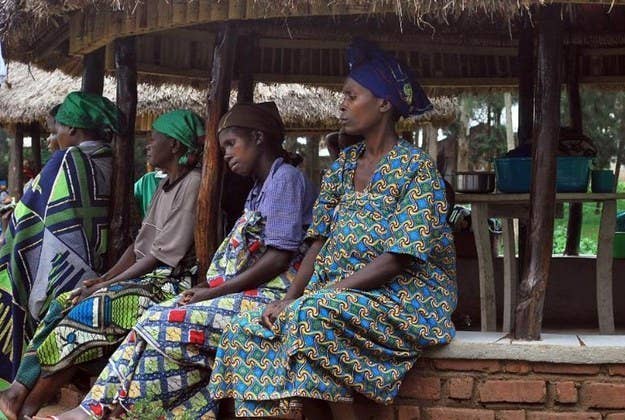
A Congolese military court today acquitted all but two of the 39 soldiers on trial for rape.
It was the biggest rape trial yet in Congo, whose eastern provinces have suffered through on-and-off war since 1996. In the last decade, soldiers and rebels alike have turned to rape as one tool of violence, with reported incidents so high that the United Nations has called the country "the rape capital of the world."
The 39 soldiers were all accused of participating in a mass rape in Minova in late 2012, after the Congolese army withdrew from the regional capital of Goma. The United Nations says at least 135 women were raped there, and women in Minova say many victims never report the crime.
One of the two soldiers convicted of rape will serve 20 years to a life; the other was sentenced to 20 years, according to the official records of the American Bar Association, which assisted with the trials.
Thirteen of the accused were acquitted of all charges; the remainder will serve varying sentences for crimes like pillaging and robbery.
"Today is a big day to remove shame from our government and our military" by holding perpetrators accountable, presiding judge Col. Freddy Mukendi said after the verdict was read.
Nadine Sayiba, one of the prosecutors working with the American Bar Association, which helped to fund the trial, said that the verdict shows that "in Congo we're able to do justice for women. In Congo, justice is possible."
Mary Mbuye, wife of one of the convicted rapists, agreed with the prosecutor. Mbuye thinks her husband's punishment is important for her country.
"When I see that they arrest my husband and it's true — he raped — I say that this justice is good justice, and I thank Congo to get good justice."
Mbuye was angry with her husband for his crimes and spoke out against what he did.
"If someone rapes, it's to kill in two ways. It's to kill in the mind, and to kill in the body," she said.
But defense lawyer Martin Kalahambire called the verdict into question. "The military court does not have the money to organize the investigation and all the things in the courts," he said. "It's the ABA who gave the military court money to do the investigation. These are the reasons we see in this judgment, in this verdict, that justice is influenced by the ABA."
Holly Dranginis, a policy associate with the Enough Project, said the process faced challenges from the beginning. Funding was an issue for both the prosecution and the defense, she said.
The indictments that set the trial in motion were "incredibly arbitrary."
"There was basically a roll call soon after the incident, and it was sort of decided that those who didn't show up for the roll call were assumed guilty. There were 39 who didn't show up, and they became those indicted for the rapes at Minova," she said.
The mass rapes became a focus of global attention, and the international community pressured Congo to hold trials.
"Rape trials like this are incredibly rare anywhere in the world, and why would the government spend time and resources and shed light on the shame of its own troops without some kind of pressure from the outside?" said Dranginis. "If you rush it you get a situation like we have today a verdict with mass acquittals and people rightly very outraged and disappointed that the guilty parties weren't found and won't be punished.
But others, like Salama Konde, saw in the day's verdict meaningful, if limited, justice.
"If you arrive in Minova, in our village, you will see many people who are victims, many people, and every one who is ashamed," she said. If a woman is raped, "maybe the husband can drop her, maybe the husband can say, 'We are divorced with you.' So we have many women who were also raped but they don't say."
"If we begin to penalize the FARDC when they rape us, it can be the good way for us."
Clarification and Correction
Only one of the convicted rapists was sentenced to up to life in prison. An earlier version of this post misstated the sentence of the other rapist. We regret the error.
This article has also been updated to clarify that two convictions for rape are indicated in the official trial records of the American Bar Association.
